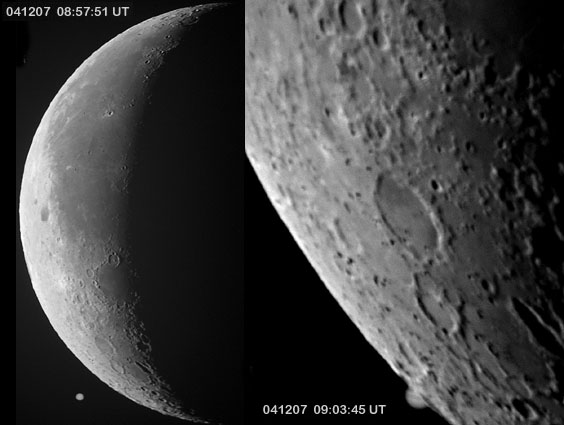Difference between revisions of "December 8, 2004"
| Line 20: | Line 20: | ||
<table class="story" border="0" bgcolor="#FFFFFF" width="90%" cellpadding="10" align="center"><tr><td> | <table class="story" border="0" bgcolor="#FFFFFF" width="90%" cellpadding="10" align="center"><tr><td> | ||
<p align="center"><b>Moon Over Jupiter Over Florida</b></p> | <p align="center"><b>Moon Over Jupiter Over Florida</b></p> | ||
| − | <p align="left">It seems we are blessed to be living at a time when astronomical rarities happen one right after another: The historic Leonid storm of a few years ago, the close approach of Mars a year ago, the alignment of planets, recent frequent naked eye sunspots, and in the early morning of December 7 an occultation of Jupiter. Like much of the US apparently, Tucson was cloudy, but in Florida, Howard Eskildsen, was able to view and image the event. Once again, as when [ | + | <p align="left">It seems we are blessed to be living at a time when astronomical rarities happen one right after another: The historic Leonid storm of a few years ago, the close approach of Mars a year ago, the alignment of planets, recent frequent naked eye sunspots, and in the early morning of December 7 an occultation of Jupiter. Like much of the US apparently, Tucson was cloudy, but in Florida, Howard Eskildsen, was able to view and image the event. Once again, as when [[March_5,_2004|Mars]] was near the Moon earlier last year, the nearness of the two bodies emphasizes how huge the Moon is compared to any other solar system object in the night sky. Jupiter is about 33 seconds of arc wide and the lovely Moon is 60 times larger, 30 minutes of arc wide, Surprisingly, many people observe this visual runt of a planet... </p> |
<blockquote><p align="right">— [mailto:tychocrater@yahoo.com Chuck Wood]</blockquote> | <blockquote><p align="right">— [mailto:tychocrater@yahoo.com Chuck Wood]</blockquote> | ||
<p align="left"><p><b>Technical Details:</b><br> | <p align="left"><p><b>Technical Details:</b><br> | ||
Revision as of 14:17, 17 January 2015
Moon Over Jupiter Over Florida
<nobr>Moon Over Jupiter Over Florida</nobr> |
Image Credit: Howard Eskildsen
|
|
Moon Over Jupiter Over Florida It seems we are blessed to be living at a time when astronomical rarities happen one right after another: The historic Leonid storm of a few years ago, the close approach of Mars a year ago, the alignment of planets, recent frequent naked eye sunspots, and in the early morning of December 7 an occultation of Jupiter. Like much of the US apparently, Tucson was cloudy, but in Florida, Howard Eskildsen, was able to view and image the event. Once again, as when Mars was near the Moon earlier last year, the nearness of the two bodies emphasizes how huge the Moon is compared to any other solar system object in the night sky. Jupiter is about 33 seconds of arc wide and the lovely Moon is 60 times larger, 30 minutes of arc wide, Surprisingly, many people observe this visual runt of a planet... Technical Details: Related Links: Tomorrow's LPOD: A Long Valley |
|
Author & Editor: Technical Consultant: Contact Translator: A service of: |
COMMENTS?
Register, and click on the Discussion tab at the top of the page.




